General Surgery Residency Curriculum
Program Details Heading link
Our education program is designed to reflect the American Council on Graduate Medical Education (ACGME) six core competencies: patient care, medical knowledge, practice-based learning and improvement, interpersonal and communication skills, professionalism, and systems-based practice. Resident evaluation is based on the ACGME General Surgery Milestones which incorporate the six core competencies. Beyond this, our assessments also consider personal development, scholarly activity, and community outreach.
Our program draws on the unique strengths of its integrated hospitals to provide breadth and excellence in clinical teaching at the bedside, in the operating room coupled with structured educational conferences and a comprehensive curriculum based in the simulation lab.
Clinical Rotations Heading link
Throughout the training program, our residents rotate through these Surgical Specialties:
Clinical Rotations
- General Surgery
- Bariatric Surgery
- Minimally Invasive Surgery
- Colorectal Surgery
- Surgical Endoscopy
- Endocrine Surgery
Clinical Rotations
- Surgical Oncology
- Breast Surgery
- Pediatric Surgery
- Plastic Surgery
- Wound Care
- Transplant Surgery
Clinical Rotations
- Vascular Surgery
- Cardiothoracic Surgery
- Surgical Intensive Care Unit
- Trauma Surgery
- Acute Care Surgery
Sample Rotation Schedule Heading link
-
Sample Resident Schedule
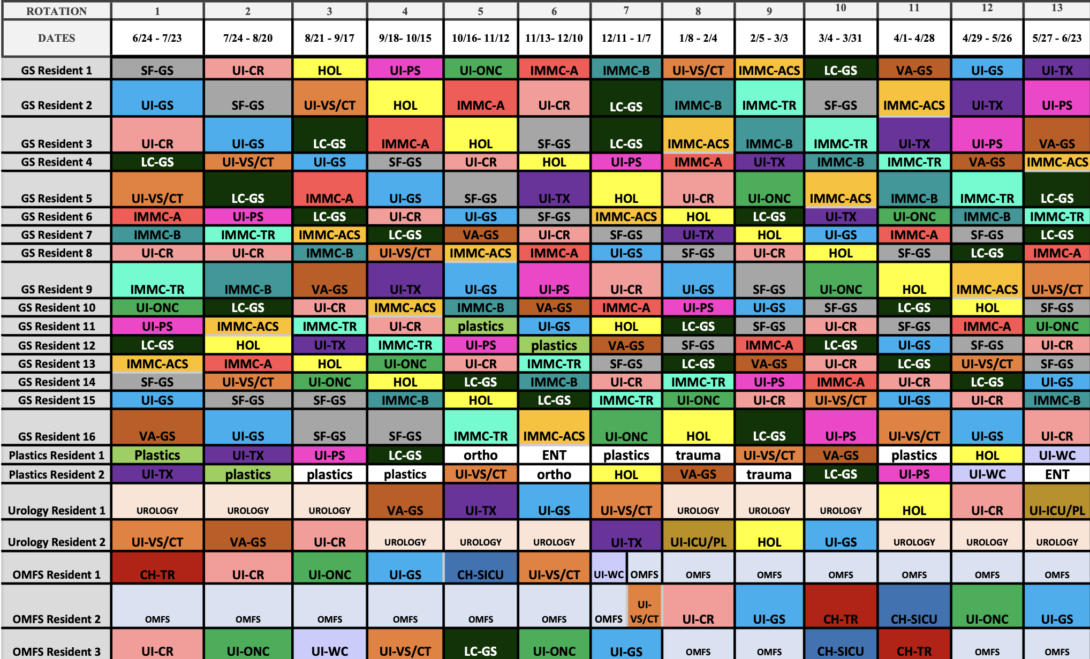
Sample PGY1 Resident Schedule
Sample PGY2 Resident Schedule
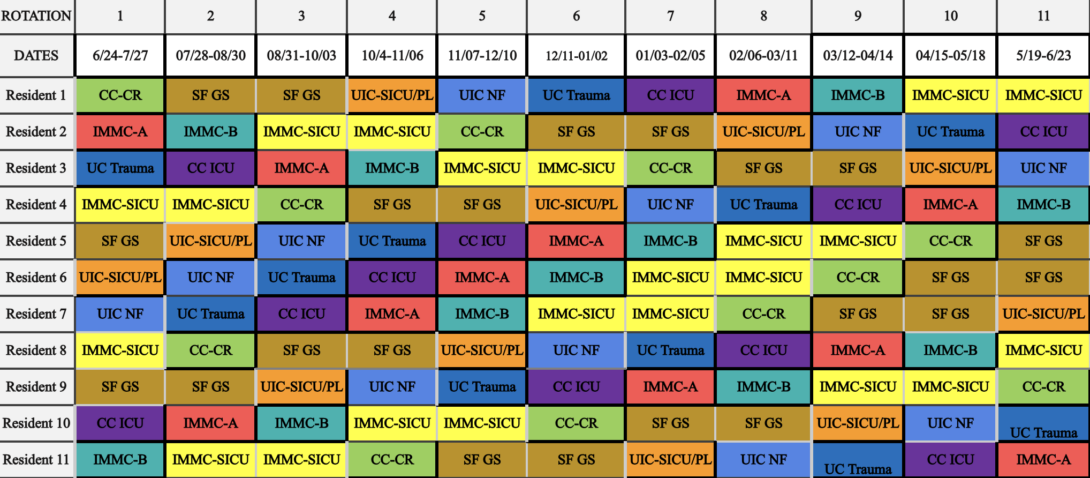
Sample PGY2 Resident Schedule
Sample PGY3 Resident Schedule
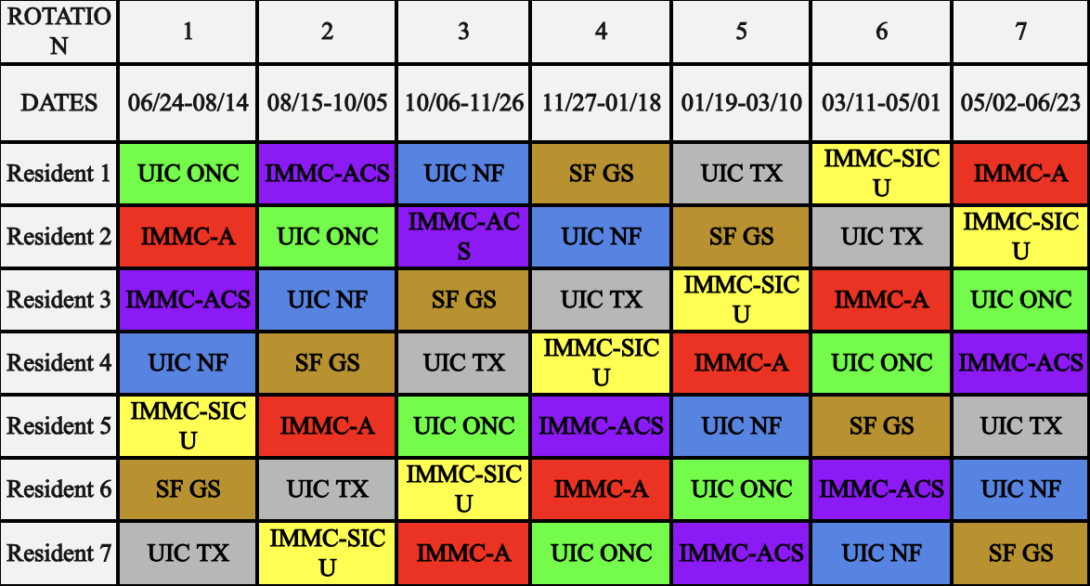
Sample PGY3 Resident Schedule
Sample PGY4 Resident Schedule
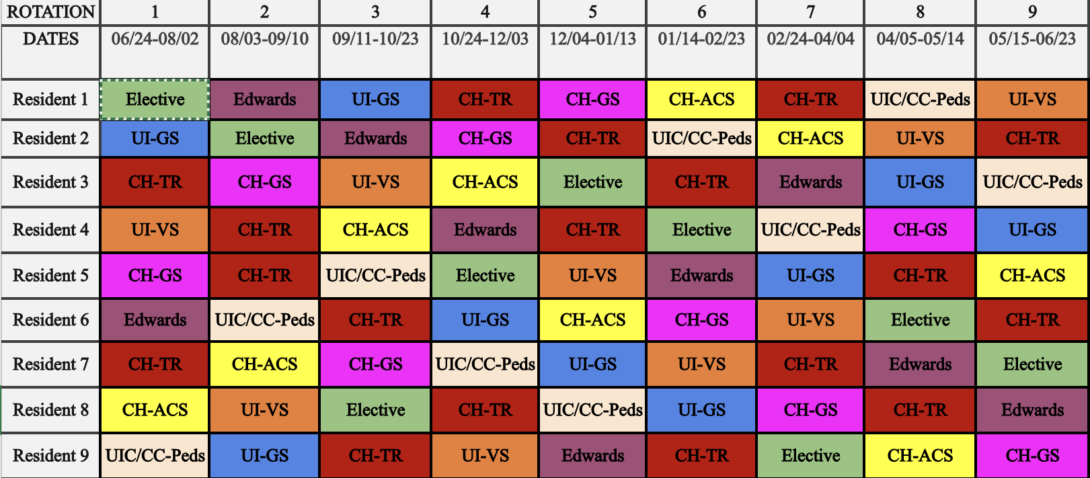
Sample PGY4 Resident Schedule
Sample PGY5 Resident Schedule
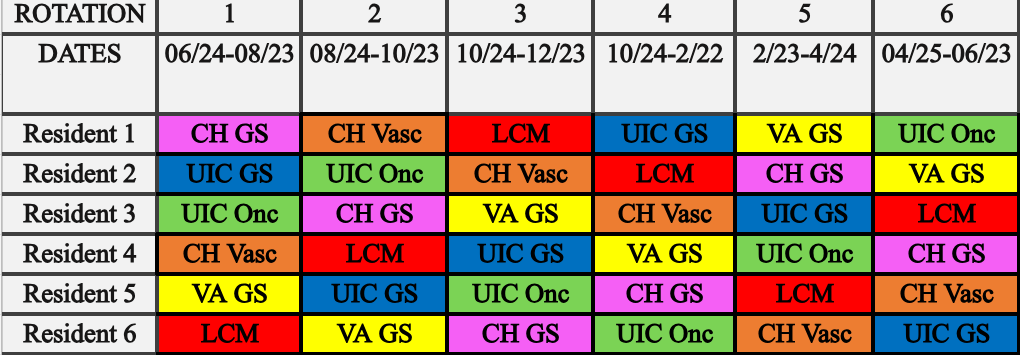
Sample PGY5 Resident Schedule
Rotation Key
Col A
- CH- B- Advocate Christ Medical Center General Surgery
- CH- C- Advocate Christ Medical Center Vascular Surgery
Col B
- CH- TR- Advocate Christ Medical Center Trauma Surgery
- CC-CR- Stroger Hospital of Cook County Colon/Rectal Surgery
- CC-ICU- Stroger Hospital of Cook County Intensive care Unit
- UI-NF- University of Illinois Night Float
- UI-GS- University of Illinois General Surgery
- UI-Onc- University of Illinois Surgical Oncology
- UI-PS- University of Illinois Pediatric Surgery
Col C
- UI-Tx- University of Illinois Transplant Surgery
- UI VS/CT- University of Illinois Vascular/ Thoracic
- VA-GS- Jesse Brown VA General Surgery
- SF — Saint Francis Hospital General Surgery
- HOL — Vacation
- IMMC-A — Illinois Masonic Medical Center Team A
- IMMC-B — Illinois Masonic Medical Center Team B
- IMMC–ACS — Illinois Masonic Medical Center Acute Care Surgery
- LC-GS — Little Company of Mary Hospital General Surgery
Surgical Education Laboratory Heading link
-
PGY1 Residents
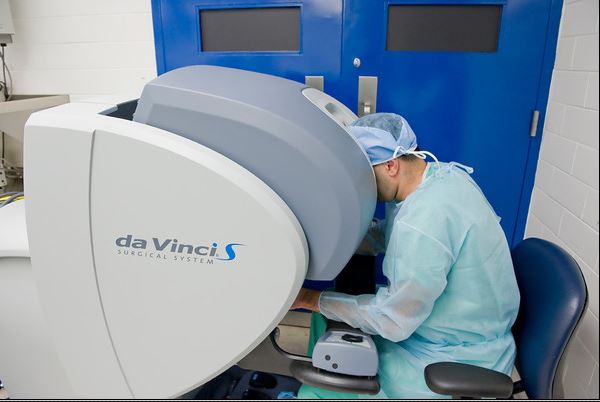
Each intern has dedicated and protected simulation time every month. During these
sessions, interns will learn the basic skills of open and laparoscopic techniques.Overview of sessions:
• DaVinci in-service training
• Open surgery, including utilizing instruments and equipment, knot tying, suturing, drain sutures
• Introduction to laparoscopic surgery, including utilizing instruments and equipment and Trocar placement
• Fundamentals of laparoscopic exam preparation
• Surgical Olympics
-
PGY2 Residents
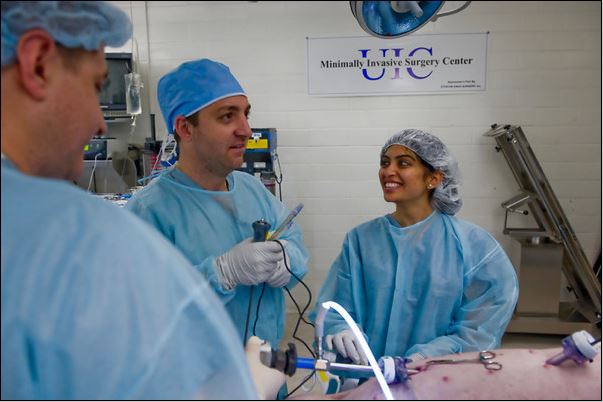
Each PGY2 has dedicated and protected simulation time every month. During these
sessions, PGY2’s will learn advanced laparoscopic skills.Overview of sessions:
• Fundamentals of laparoscopic exam preparation
• Open operative skills lab
• Safe cholecystectomy course with Dr. Giulianotti
• Inguinal hernia course with Dr. Sbrana
• Bariatric surgery course with Dr. Masrur
• Surgical Olympics
• Robotic skills lab
-
PGY 3 Residents
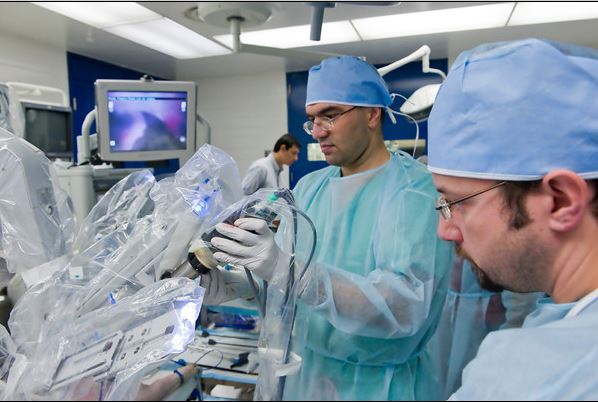
Each PGY3 has dedicated and protected simulation time every month. During these
sessions, PGY3’s will learn advanced laparoscopic and basic robotic skills.Overview of sessions:
• Open operative skills lab
• Safe cholecystectomy course with Dr. Giulianotti
• Inguinal hernia course with Dr. Sbrana
• Bariatric surgery course with Dr. Masrur
• Robotic skills lab
-
PGY 4 Residents
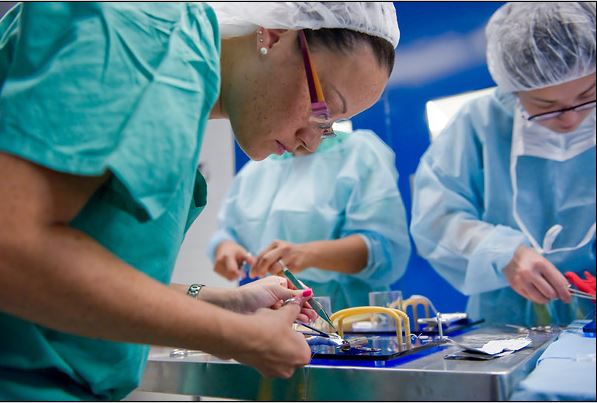
Each PGY4 has dedicated and protected simulation time every month. During these
sessions, PGY4’s will learn advanced robotic skills.Overview of sessions:
• SP robotic course with Dr. Bianco
• Robotic bowel anastomosis course with Dr. Hassan
• Distal pancreatectomy course with Dr. Giulianotti
• Whipple Step-by-step course with Dr. Giulianotti
• Adrenalectomy course with Dr. Giuilianotti
Conference and Didactic Heading link
Every Wednesday morning, residents have protected time to attend conference. The SCORE curriculum is incorporated through weekly lectures given by faculty and ABSITE review questions. Grand Rounds presentations are regularly given by nationally-recognized guest speakers and chief residents. Monthly, senior residents are given board-style mock oral exams and receive constructive feedback. Residents present interesting cases in Clinical Correlations, which are discussed with experts in
the field.
In addition to the weekly Wednesday conference attended by all residents, the surgical services at the different hospital sites may have separate teaching conferences, tumor board and morbidity and mortality conferences that the residents attend.
Simulation Lab, Resources and Assessment Heading link
Residents have monthly simulation sessions in access to the SITL (Surgical Innovation and Technology Lab) for monthly simulation curriculum. In these sessions, residents receive training in open skills, laparoscopic techniques, and robotics. The curriculum consists of various courses and opportunities to practice using synthetic and animal models. These sessions include a wide variety of experiences, including open skills, FLS preparation, in-service training on robotics, endoscopic training and didactics, minimally invasive courses, operating on animal models, and computerized simulation.
Residents have access to the SCORE learning bank, as the didactic schedule follows the SCORE curriculum. Weekly quiz assignments are given to those who are struggling and upon request. Residents are also given have a subscription for the TrueLearn question bank throughout their training, as well as a board preparation feature prior to graduation. Other learning resources, such as textbooks and courses, are provided throughout training as well.
Residents are continuously assessed using various approaches. Formal evaluations are completed through New Innovations and EPA’s (Entrustable Professional Activities) using the SIMPL app. Direct feedback is strongly encouraged as well. Biannual Milestone meetings are done with the program leadership to summarize performance and goal-setting.
Research Opportunities Heading link
In addition to a robust clinical experience, residents are highly encouraged to pursue research endeavors. There are two three residents per class who are designated on our Academic Track, taking non-clinical years for research during their training. All of our residents are fully funded by our program during that time.
Even those who do not elect to take research years have plenty of opportunities to participate in surgical research. The program will cover the cost of publications, conference attendance and travel if you are giving an oral presentation presenting, and research costs. As a university hospital, there are numerous ongoing projects within each division of surgery, with plenty of support staff (research fellows, biostatisticians, medical illustrators, grant writers). We provide residents with the tools and mentorship necessary to foster their growth as future leaders in surgery.